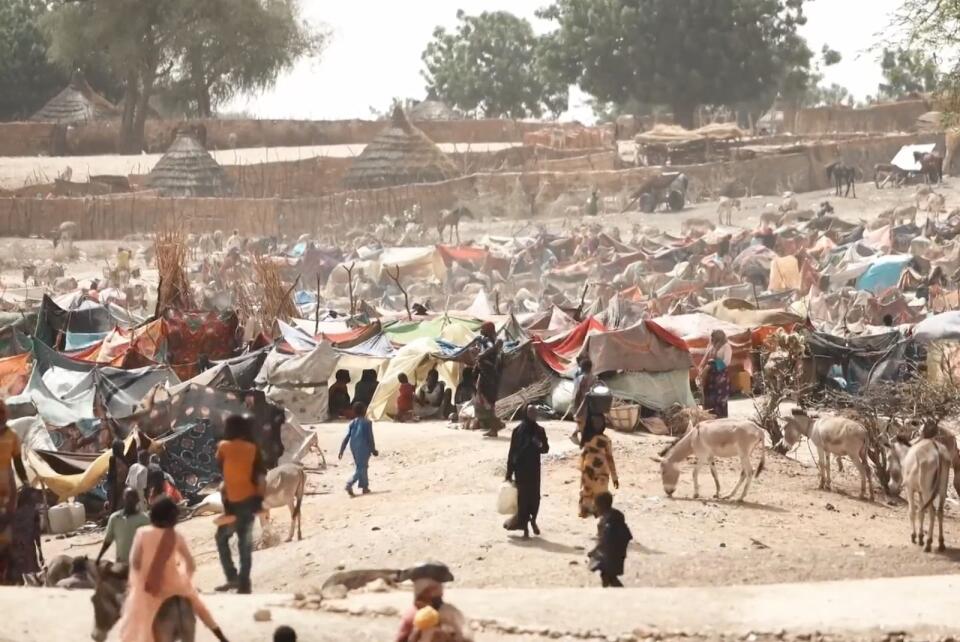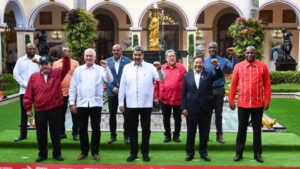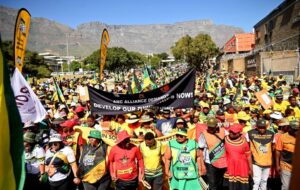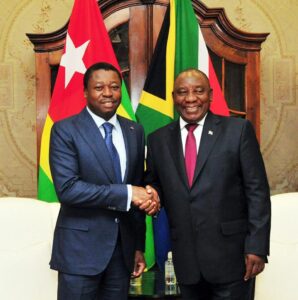Screengrab of refugee camp. In the year since the war began on April 15, 2023, Sudan has seen well over 14,600 deaths, with 10.7 million displaced inside and outside the country and 18 million people suffering from acute food insecurity. With no end in sight as the fighting continues, civilians remain at risk from the fighting as well as famine, the writer says. – Picture: Henry Wilkins / VOA / Wikipedia / Created May 16, 2023
By Julie Gregory
For the first time in nearly 20 years, Sudan is without a UN peace operation that enables or supports the protection of civilians, increasing the likelihood that the already severe protection gaps in country will worsen.
This danger is particularly significant as the war between the Sudanese Armed Forces (SAF), led by General Abdel Fattah al-Burhan, and the Rapid Support Forces (RSF), led by General Modamed Hamdan Dagalo (known as “Hemedti”), shows no signs of stopping.
In the year since the war began on April 15, 2023, Sudan has seen well over 14,600 deaths, with 10.7 million displaced inside and outside the country and 18 million people suffering from acute food insecurity. Both sides have reportedly committed war crimes, and evidence suggests the RSF has conducted ethnic cleansing and crimes against humanity in Darfur.
The fighting is ongoing in the capital, Khartoum, and across the five states of Darfur, West and South Kordofan, and Blue Nile, with 4.4 million people directly at risk in hotspot areas. Civilians must navigate a horrid reality of indiscriminate attacks on their persons and communities, widespread conflict-related sexual violence, extensive forced displacement, frequent looting and destruction of civilian infrastructure, and highly limited humanitarian assistance. There is thus an overwhelming need to advance multilateral engagement on the protection of civilians in Sudan.
A Reduced Footprint in Sudan
The closure of the UN Integrated Transition Assistance Mission in Sudan (Unitams) at the end of February 2024, following the withdrawal of consent in November 2023 by the de facto military authorities, has exacerbated the already significant protection gaps in country. Established by the Security Council in June 2020, Unitams was specifically mandated to “assist peacebuilding, civilian protection and rule of law, in particular in Darfur and the Two Areas”, among other priorities.
However, unlike its peacekeeping predecessor, Unamid, Unitams had a country-wide mandate and no ability to physically protect civilians. Throughout its deployment, the work of Unitams on the protection of civilians remained limited in scope, with its success dependent on host authorities taking action to protect civilians.
With Unitams’ departure, there is no longer a UN entity in Sudan focused on the comprehensive protection of civilians. The drawdown of Unitams has reduced the UN’s capacity to verify and report on conflict-related human rights violations and maintain grassroot networks that inform early warning efforts. The mission’s departure also led to the dissolution of the Permanent Ceasefire Committee in Darfur, which continued to meet throughout the war, and coincided with the disintegration of the state-level Protection of Civilians Committees in Darfur.
Furthermore, the mission’s drawdown appeared to halt dialogue with the military authorities on protecting civilians; ended support to Sudanese police on professionalising and building trust with local communities; and stopped efforts to re-envision Sudan’s approach to disarmament, demobilisation, and reintegration, which is necessary for any future peace. The exception to these gaps is that the UN Country Team committed to addressing protection needs resulting from grave violations against children and conflict-related sexual violence, which it had previously partnered with Unitams on.
Work by UN agencies in-country remains largely impeded by the volatile security situation and restrictions imposed by the conflict parties. As a result, UN agencies have been forced to scale back their presence and activities, especially in Darfur. For instance, two World Food Programme humanitarian aid convoys were only able to cross the border from Chad into Darfur in early April 2024 after the de facto military authorities had blocked all passage of aid from Chad two months earlier.
The Human Rights Council’s Fact-Finding Mission has also urged parties to allow the full and immediate delivery of humanitarian aid to civilians in need, stating that it is investigating attacks on aid convoys and warehouses, as well as the blocking of humanitarian aid. As the lean season approaches, the risk of famine heightens, particularly as cereal production in the Darfur and Kordofan regions is estimated to be as much as 80 percent below average.
Examining Options for UN Action
From April through November 2023, the Security Council relied on Unitams as its key vehicle for navigating relations with the conflict parties and monitoring the impact of the war on civilians. However, the UN now needs to consider other options to mitigate the conflict and address the targeting of civilians and massive humanitarian crisis.
In early March 2024, the Council passed a resolution calling for an immediate cessation of hostilities for the month of Ramadan, with Russia abstaining. Despite the resolution’s binding nature, however, fighting went on unabated. Council press statements urging the conflict parties to protect civilians and abide by international humanitarian and human rights laws also appear to have had no impact.
The UN sanctions regime concerning Sudan is also unlikely to produce Council action, let alone reduce conflict events. The sanctions committee on Sudan, originally established in 2005 in accordance with Resolution 1591, has failed to list any new individuals or entities in response to the war, despite the egregious violations reported by the Panel of Experts on Sudan in December 2023, including the killing of 10,000 to 15,000 people in El Geneina.
With the sanctions regime set to expire in September 2024, the issue of sanctions concerning Sudan will likely remain a divisive issue, particularly given member states’ differing stances on the use of sanctions in Sudan. The imposition of further sanctions is thus doubtful and unlikely to change the behaviour of the conflict parties.
One mechanism that could drive action is the Secretary-General’s Personal Envoy for Sudan, Ramtane Lamamra of Algeria, appointed in late November 2023. The envoy is responsible for providing good offices to the conflict parties and working to coordinate and de-conflict the myriad political dialogues underway. Given the confidentiality of the work, however, it is difficult to evaluate Mr. Lamamra’s level of influence. Some Sudanese civilian representatives have voiced dissatisfaction with his approach to date. This has included concern about the envoy’s seeming lack of engagement with civil society, including with Taqaddum, a prominent pro-democracy civilian coalition.
Others have expressed worry that the envoy is privileging consultations with the de facto military authorities. If this is true, such an approach could bias the outcome of a negotiated settlement and exacerbate conflict dynamics with the RSF.
Assuming he can maintain working relations with both the SAF and RSF, the envoy will remain a critical actor in engaging the conflict parties and identifying potential areas for progressive wins on the protection of civilians. Centring civilians in the envoy’s work is also essential for integrating protection issues into political discussions and ensuring that civilian leaders and civil society are seen as formative stakeholders in shaping the country’s future.
Centring Protection in the Political Approach
Over the past year, there has been a proliferation of political initiatives focused on ending the war between al-Burhan and Hemedti. This has included talks facilitated by the African Union (including the creation of a High-Level Panel on the Resolution of the Conflict), the Intergovernmental Authority on Development (IGAD), Saudia Arabia and the United States (known as the Jeddah process), and a group of neighbouring countries (Central African Republic, Chad, Egypt, Eritrea, Ethiopia, Libya and South Sudan).
However, as the Sudan Panel of Experts reported, this approach has yet to yield results due to the “excess of mediation tracks and insufficient coordination, as well as entrenched positions of the warring parties combined with competing regional interests”. The conflict parties also seem to have taken advantage of the diverse approaches and split focus of influential stakeholders to continue fighting.
Discussion of the protection of civilians would appear to be deprioritised within these various initiatives, with member state attention primarily on ending hostilities. By focusing on a ceasefire as an immediate output of these talks, UN member states are operating under the assumption that the protection of civilians will be a natural by-product of a pause or halt to the conflict.
There is, however, no guarantee that the conflict parties will stop committing abuses against civilians once a ceasefire is established, let alone protect them, unless further safeguards are put in place, particularly given the RSF’s direct connection to the 2000s genocide in Darfur.
The exception within these initiatives is the Jeddah talks, which originally set out to achieve a humanitarian ceasefire. Initial talks in May 2023 led to the SAF and RSF signing the Jeddah Declaration of Commitment to Protect the Civilians of Sudan, though the parties failed to abide by the commitments therein.
The planned resumption of the Jeddah process, which is expected to include Egypt, the United Arab Emirates, the African Union, and IGAD, may provide the opportunity to reinvigorate discussion of the protection of civilians. The talks could incorporate protection issues in two main ways: by 1) identifying immediate confidence-building measures on the protection of civilians and 2) incorporating protection guarantees and a monitoring mechanism into a ceasefire agreement.
Confidence-building measures that the parties have agreed to within the Jeddah framework as of November 2023 have been remarkably silent on protection issues. Realistic and achievable measures on civilian protection could help pave the way for larger concessions from the parties, like the withdrawal of combatants from urban areas or a renewable cessation of hostilities. Acting on these measures would also be in the conflict parties’ strategic interests, should they care about being perceived as legitimate actors in the eyes of Sudanese people.
Importantly, civilian leaders and civil society from across Sudan should be meaningfully consulted and represented in high-level talks with the conflict parties, from which they have been absent to date, including in the Jeddah process. Incorporating the views and voices of civilian leaders, including those outside of traditional elite circles, is essential for informing discussion of protection needs and making sure the talks produce an end state where the safety and security of civilians is ensured.
Preparing for a Future Peace
UN member states, in coordination with the Secretary-General’s personal envoy, should consider what may be needed to protect civilians in the case of a cessation of hostilities or ceasefire agreement. A verification mission may prove the best vehicle for de-escalating tensions and ensuring the guns remain silent.
The design of such a mission could take inspiration from the past successes of the multinational Joint Military Commission, deployed from 2002 to 2005 in the Nuba Mountains, and Unitams’s Ceasefire Committee in Darfur. Both initiatives appear to have been accepted due to their narrow scope, localised nature, and equitable representation of the conflict parties within the structure of each mechanism.
Given that the Jeddah process appears to retain the greatest level of buy-in from the conflict parties, its member-state convenors could utilise their influence to help facilitate the deployment of a multinational verification mission in support of a ceasefire agreement. Alternatively, such a mission could be led by the UN or African Union. The UN holds the appropriate experience and expertise to deploy such a mission rapidly but may be blocked by the parties over a lack of consent, building on the host authorities’ dissatisfaction with prior UN peace operations.
In contrast, an African Union-led mission may have a greater chance of being accepted by the parties but could lack the capacity and funds to deploy a mission quickly and with the appropriate expertise. As a result, the African Union could request use of Security Council Resolution 2719, which could enable UN assessed contributions to support up to 75 percent of the annual budget for an AU-led verification mission in Sudan.
Regardless of the path taken, it will be essential that the UN, African Union, and member states alike unite behind a common approach for addressing the protection of civilians in Sudan and ensuring a future peace holds.
Julie Gregory is a Research Analyst at the Stimson Centre.
This article was published on Global Observatory




